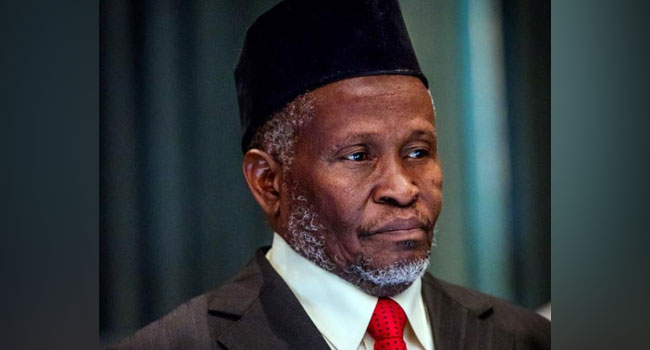Recent events in the country have compelled some Nigerians to wonder if the judiciary can still be said to represent the last hope of the common man. And the landmark judgment that removed the Imo State governor has unfortunately attracted unfavourable commentaries from Lawyers, politicians and other stakeholders in the country
By Anayo Ezugwu
EVER since Justice Ibrahim Tanko Muhammad took over as the Chief Justice of Nigeria, CJN, the judiciary has been struggling to regain public trust. Justice Tanko as he is fondly called leads Nigeria’s judiciary at a time public distrust for the institution is at its lowest. The incidence that led to his emergence on January 25, 2019 still remains evergreen on the minds of many Nigerians and might remain a reference point after his reign as the CJN.
He was sworn-in by President Muhammadu Buhari on January 25, 2019. His appointment followed an experte order of the Code of Conduct Tribunal, CCT, on January 23, 2019, which suspended Justice Walter Onnoghen, former CJN from office.
The CCT ordered Justice Onnoghen to step aside as the CJN pending the determination of the 6-count charge brought against him before the tribunal for false asset declaration. The CCT also ordered the president to swear in Justice Ibrahim Tanko Muhammad, being the next most senior Justice of the Supreme Court as the acting Chief Justice of Nigeria.
Justice Tanko was on July 17, 2019 confirmed by the Senate as the substantive CJN and subsequently sworn-in by President Buhari to act in the capacity. Since he became the CJN, the judiciary, which is regarded as the last hope of the common man, seems to have lost public trust.
Some controversial political ruling emanating from the Supreme Court as a result of the 2019 general elections is not also helping Tanko and the judiciary. The recent declaration of Hope Uzodinma of the All Progressives Congress, APC, as the governor-elect of Imo State by the Supreme Court is still generating reactions from lawyers and political commentators.
Under his watch, court rulings are easily ignored by the executive branch of government and its agencies. And judges’ intimidation by state agents seems to be on the increase. The recent detention of Omoyele Sowore, human right activist and Agba Jalingo, Nigerian journalist are typical examples of blatant disobedience of court orders by state agencies.
Even Abubakar Malami, minister of justice and attorney general of the federation justified the continued disobedience of court orders by the federal government despite court orders, which granted them bail. Malami, while being screened by the Senate as a ministerial nominee on Friday, July 26, 2019, said Section 174 of the 1999 Constitution (as amended) made provisions for the public interest to take preference to private interest. He said the high-profile individuals remained in detention in public interest.
“I concede as argued by the Minority Leader, Senator Enyinnaya Abaribe (PDP Abia South), that a Minister of Justice and Attorney General as stipulated by sections 36, 37 and 39 of the constitution, is supposed to protect the rights of any citizen from being violated even by the state, but where such rights conflict with the public interest, the latter overrides the former. The Office of the AGF has exclusive responsibility to uphold the public interest above personal interest of anybody,” he said.
Some lawyers believe that Justice Tanko is repositioning the judiciary, but the circumstances surrounding his appointment will always cast doubt on his achievements. Vince Ayogu, lawyer, believes that there is so much erosion of confidence on the Nigerian judiciary. “If you look at where the judiciary was coming from vis a vis the illegal removal of Onnoghen and the assumption of office by Tanko, you will know that the judiciary is in crisis. And there was so much erosion of confidence in the judiciary even before Tanko Mohammed assumed office.
“So he stepped into an office that is seen as a battered one and as the stooge of the executive arm of the government. That alone doesn’t help him and that alone has in one way or the other influence how people look at the judiciary. But personally I have always known Tanko Mohammed as a hard working judicial officer.
“I don’t think that he as a judicial officer, has failed. That doesn’t mean that we don’t have one issue or the other along the line. The issue of executive encroachment on the judiciary or political office holders who have invaded the judiciary seeking one favour or the other in terms of judicial pronouncement, all these put together have not helped the judiciary under Tanko. But given the environment we operate, I don’t think the judiciary has failed as badly as people make out.”
On judgment from the Supreme Court, Ayogu said: “Like I told you, the judiciary and particularly the Supreme Court has been deciding a lot of cases apart from political cases. You know the one that we get to hear on a daily bases, especially those who are not lawyers are political cases. Apart from political cases, there have been a lot of decisions emanating from the Supreme Court. A lot of landmark decision emanated from the judiciary in the last one year, which are to me in my personal view is commendable.
“I think we have to encourage them. That doesn’t mean we don’t have the bad eggs. There are a lot of bad eggs in the system and if we are able to remove them, the better for the judiciary. But if you compare the judiciary with other arms of government in Nigeria, you will find out that the judiciary is the only sane arm of the government in Nigeria.”
But Abdulaziz Ibrahim, lawyer, is of the opinion that the judiciary has improved administratively under Tanko. “Let me be subjective, in the last one year I just realized that there are a lot of fast-tracking at the Supreme Court. Most issues like petitions now receive quick response and you get your queue answered. Things are a bit easier on that aspect that is administratively.
“Since his appointment, things have been speedily. Most of my petitions and issues that I’m trying to get answers from the Supreme Court do come out quickly without you even making phone calls, telling people to help you track your file or something. Yes administratively, things have been good.
But the fact of the matter is that the way and manner Onnoghen was removed, sincerely, it wasn’t proper. That is my personal opinion because if you look at the removal of a CJN, the constitution says there has to be an address by the Senate and that never happened. They just used an experte order. So the blame is everywhere. But for this one year of His Lordship Justice Tanko, sincerely I found things easier administratively,” he said.
Ibrahim called on the CJN to improve the welfare of the judges. “By their welfare, I mean also their security. These judges need to believe that they will be covered whenever anything happens. Don’t forget that during the height of Abacha’s regime there were judges who were passing judgment against the government.
“Even when Buhari was a military leader, there were judges passing judgment against him. Some were victimized while others were forced to resign. So these men and women should be made to understand that they are working for the nation. If there is any arm of government that can save this country, it is the judiciary. The executive and the legislature are manned by politicians, so it is only the judiciary that you can look up to.”
On the issue of whether the judiciary is under attack by the executive, Tayo Oyetibo, a Senior Advocate of Nigeria, SAN, said the current situations in the country are suggestive of the return of the Dark Ages of military dictatorship.
Oyetibo, who stated this in a paper titled, “Is the judiciary under siege by the executive?” which he delivered at the 16th Gani Fawehinmi Annual Lecture on Wednesday, January 15, said: “When you see men who are otherwise referred to as secret agents, because of the undercover work that they do, appear at night, in hoods in the homes of judges, in a Gestapo manner, breaking doors and locks to gain entry; when orders are made by the court granting bail to persons accused of commission of crime, but the executive refuses to release the defendant for more than three years after the order was made; when the Chief Justice of a nation is removed from office by the executive upon an ex parte order made at the instance of the executive by a body that is and openly admits to being subject to the control of the executive; when a citizen, who has been granted bail and was only released by the executive after having been given ultimatum by the court, is forcibly removed from the courtroom whilst the court was sitting under the guise of being rearrested by the body that had held him captive despite the order of bail; and when a judge gives a decision which the executive finds unpalatable and a week thereafter the judge is required by the executive to declare his assets for investigation; then it should not be difficult to know that the perilous times of attack on the judiciary is here with us.”
Oyetibo called on the NBA to stand up and defend the judiciary just as he urged the judges to live above board. “While judicial officers must exhibit high degree of competence and diligence, uncompromising sense of discipline, an unscathed level of probity, integrity, transparency and incorruptibility, the executive must never, in any circumstance, employ self-help in the guise of correction of the judiciary,” he said.
On his part, Ayogu regretted that politicians and the executive arm of government seem to be more emboldening in invading the judiciary. “It has always been like that since we return to democracy in 1999, but it seems like the politicians are now more daring than ever. The politicians having seen that it is possible to cow the judiciary by unceremoniously and illegally removing the principal officer of the judiciary in Nigeria, they feel that there is no limit to what they can do. And to me it has now become a free for all fight in a bid to control the judiciary. If you say that the judiciary is on trial, you are not far from the truth,” he said.













